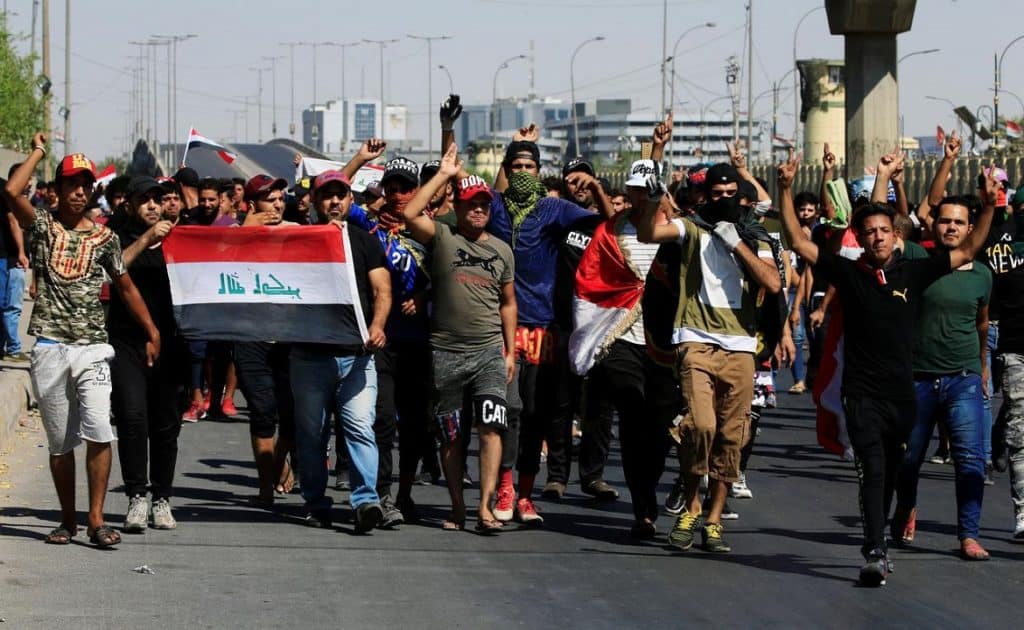By Denis Korkodinov
The social unrest that excited Iraq in early October 2019 revealed significant problems for Iraqi society. People were dissatisfied with the high level of corruption and the lack of a quality public administration system. This was the basis for protesting the Prime Minister of Iraq, Adil Abdul-Mahdi.
Adil Abdul-Mahdi, who became Iraqi Prime Minister after defeating the Islamic State in 2018, was able to obtain a mandate of confidence from the local population because he promised to restore order in the country, eliminate corruption and neutralize any manifestations of terrorist activity.
However, the new head of the Iraqi government managed to win the sympathy of ordinary residents also for the reason that he personified the secular beginning of state administration. And since Iraqis, for the most part, were tired of the religious dictates of ISIS, they were ready to give their preferences to any candidate who would embody the image of the direct opposite of jihadists.
Meanwhile, Adil Abdul-Mahdi could not have become Iraqi Prime Minister without the help of Washington, who was interested in having an official loyal to the Americans at the head of official Baghdad. Moreover, for most Iraqis at that time, the United States was the main force capable of delivering a crushing blow to the Islamic State. In this regard, Adil Abdul-Mahdi’s main competitor for the post of head of the Iraqi government, Qais al-Qazali, the leader of the Shiite group Asaib Ahl al-Haqq, had practically no chance of victory.
The fact is that Asaib Ahl al-Haqq, represented in the Iraqi parliament by the Binaa bloc, actively advocates the expulsion of American troops from the country, which, accordingly, does not like the White House administration. For this reason, Washington is committed to ensuring that Qais al-Qazali’s opinion does not receive significant support among the vast majority of Iraqis.
The head of the parliamentary bloc of Islam, Sabah al-Saidi, and spiritual leader Muktad al-Sadr also failed to secure US support for the reason that they consolidated with the Binaa bloc and opposed the presence of American troops in Iraq.
Thus, Adil Abdul-Mahdi at the time of his election nomination was the only one whose candidacy suited the White House administration. His main task as the Prime Minister of Iraq was to ensure the realization of American interests. At the same time, the need for social support of the population was put by him in the background. In turn, ignoring internal problems from the head of the Iraqi government allowed the Binaa and Islam blocs to join forces in the struggle for the mood of voters.
The Binaa and Islam Alliance is a unique phenomenon on the political landscape of Iraq, as the two blocs hold diametrically opposed views on a number of key issues. So, the Binaa bloc is an exclusively pro-Iranian grouping, consisting mainly of former field commanders of the Iraqi militia Hashd al-Shaabi. Meanwhile, the Islam bloc takes a principled position related to the demand for the complete demilitarization of Iraq and the withdrawal of all foreign troops from the country. Moreover, this requirement applies not only to US troops, but also to armed groups loyal to Iran.
As a result, a majority coalition was formed against Adil Abdul-Mahdi in the Iraqi parliament, which created the basis for an internal political impasse, as the initiatives of the country’s prime minister were usually blocked by the parliament, and the initiatives of the parliament were ignored by the head of the Iraqi government.
In addition, under pressure from the majority coalition, Adil Abdul-Mahdi was able to approve only 5 loyal officials as ministers, while 17 ministries were led by supporters of Binaa and Islam. Nevertheless, until June 2019, the posts of ministers of defense, internal affairs and justice remained vacant, since parliamentary blocs could not agree on candidates for eight months.
The culmination of the domestic political crisis was that Ayatollah Muktad al-Sadr threatened to openly oppose Adil Abdul-Mahdi if he would prevent the Islam bloc from forming a workable government.
Another manifestation of the internal political crisis in Iraq is the process of adopting the budget for 2019. According to the initiative of the head of the Iraqi government, more than 50 percent of the state budget was allocated for the maintenance of the state apparatus, while the costs of social welfare of citizens and health care were significantly cut.
As a consequence, Binaa and Islam took people to the streets, demanding reform and the resignation of Adil Abdul-Mahdi. In such circumstances, it will be very difficult for the current head of the Iraqi government to find a way out of the political deadlock that has arisen, since even reforms cannot be painlessly accepted by Iraqi society.
In particular, if spending on the state apparatus is reduced, former supporters of Adil Abdul-Mahdi will show dissatisfaction and demand its overthrow, using the factor of the revival of the Islamic state, including. If the state budget of Iraq remains unchanged, the local population, brought to poverty, under the auspices of the Binaa and Islam blocs can organize a coup d’etat, as a result of which Adil Abdul-Mahdi will lose power.
(The views expressed in this article belong only to the author and do not necessarily reflect the views of World Geostrategic Insights)
Image Credit: REUTERS/Alaa al-Marjani







